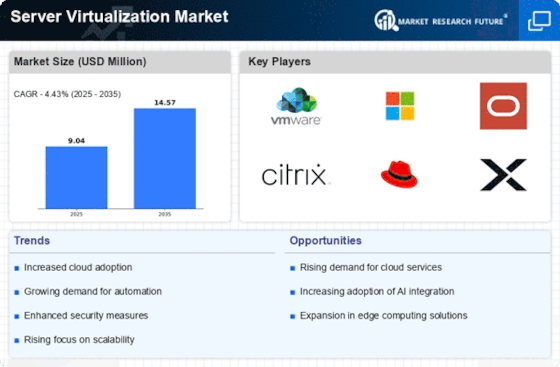Top Industry Leaders in the Server Virtualization Market
Competitive Landscape of Server Virtualization Market
The server virtualization market is a dynamic space with established players and emerging competitors vying for dominance. This report delves into the competitive landscape, analyzing key players, strategies adopted, factors for market share analysis, emerging companies, and current investment trends.
Key Players:
- Nec corporation (US)
- Parasoft (US)
- Symantec corporation (US)
- Unisys (US)
- Google LLC (US)
- 12k2 networks (India)
- Huawei (China)
- Hewlett-Packard co. (US)
- Proxmox servers solutions gmbh (Austria)
- International business machines corporation (US)
- Accenture (Ireland)
- Ca technologies (US)
- Capgemini se (france)
Strategies Adopted:
- Product Innovation: Key players are constantly investing in research and development to improve performance, security, and functionality of their virtualization software.
- Cloud Integration: Integrating virtualization solutions with cloud platforms like AWS, Azure, and Google Cloud is a key strategy to cater to the growing demand for hybrid cloud environments.
- Subscription Models: Shifting from traditional licensing models to subscription-based offerings provides recurring revenue and aligns with the changing customer preference for pay-as-you-go services.
- Partnerships and Acquisitions: Strategic partnerships and acquisitions allow companies to expand their product portfolio, reach new markets, and gain access to complementary technologies.
Factors for Market Share Analysis:
- Market Share: Revenue and market share are key metrics for evaluating a company's performance.
- Customer Base: The size and type of customer base (enterprise, SMB, etc.) provide insights into a company's target market and growth potential.
- Product Portfolio: The breadth and depth of a company's product portfolio determines its ability to cater to diverse customer needs.
- Brand Recognition and Reputation: Strong brand recognition and industry reputation attract customers and inspire trust.
- Technology Innovation: Continuous investment in R&D and innovative features differentiate a company from its competitors.
New and Emerging Companies:
- Proxmox VE: An open-source virtualization platform gaining traction in the SMB and cloud hosting segments.
- OpenNebula: Another open-source platform offering a comprehensive suite of virtualization features.
- CloudHedge: A cloud-native virtualization platform designed for containerized workloads.
- Unikernels: A new technology offering lightweight and secure virtual environments.
Current Company Investment Trends:
- Artificial Intelligence (AI) and Machine Learning (ML): Integrating AI and ML into server virtualization can optimize resource utilization, predict performance issues, and automate tasks.
- Security: Enhancing security features is crucial to address evolving threats and gain customer trust.
- Multi-cloud Management: Providing tools for managing workloads across multiple cloud platforms is essential for hybrid cloud environments.
- Containerization: Integrating containerization technologies like Docker and Kubernetes with server virtualization offers greater flexibility and resource efficiency.
Latest Company Updates:
June 2023- Proxmox Server Solutions lately unveiled the stable launch of Promox Virtual Environment VE 8.0, the new version of their server virtualization management platform. This major release based on Debian 12 (Bookworm) provides a seamless upgrade path for the users of the Promox VE 7.4 & older.
This updated version will leverage a new Linux kernel 6.2 as a stable default together with the current versions of the QEMU 8.0.2, Ceph Quincy 17.2.6, ZFS 2.1.12, and LXC 5.0.2, and other top open-source technologies for the virtual environments.
The Proxmox VE 8.0 offers an intuitive user interface that is web-based and crucial management tools for convenient management of entire data centers or individual hosts. This platform will enable users in using out of the box tools, that is accessible through the web browsers or the command line. The current version comes with various notable improvements. The incorporation of Ceph Quincy will bring about a novel convenience level as this will allow users in easily running and managing Ceph storage from a cluster node easily, easing the setup & management of the hyper-converged infrastructures.
Besides, the addition of a stable enterprise repository will expand the access to all the customers of Proxmox with active subscription. Another chief feature is the launch of the authentication realm sync jobs that will automate synchronization of LDAP-based realm users & groups which also includes LPAP & Microsoft Active Directory that too on regular intervals. The automation will work wonders in reducing management complexity and minimizing configuration errors, providing a smoother experience overall for the administrators.










